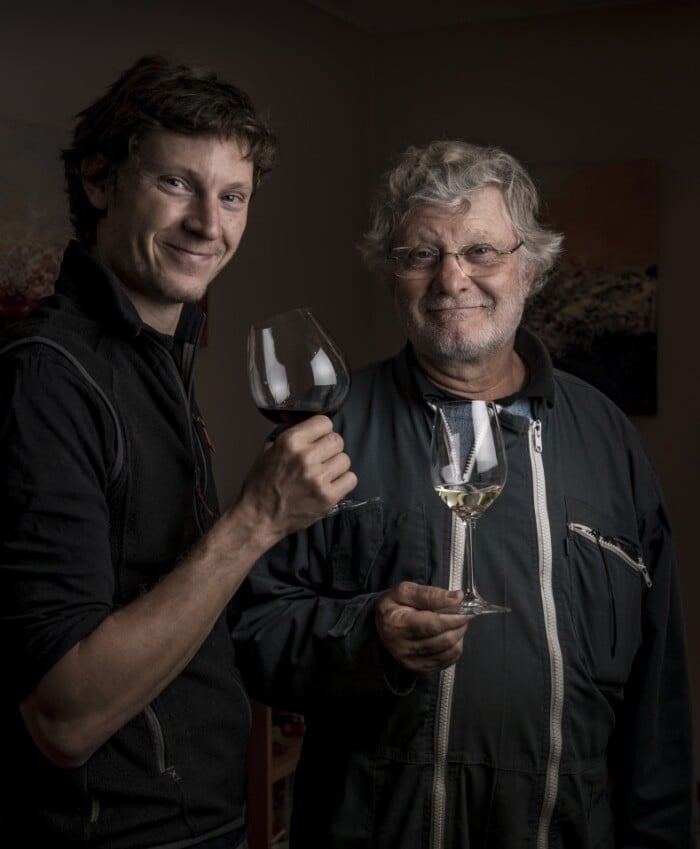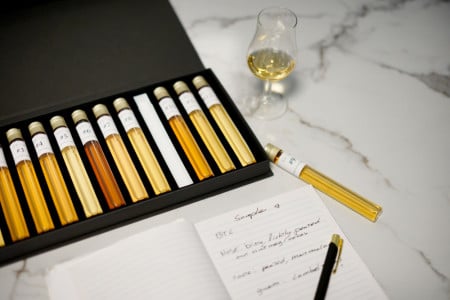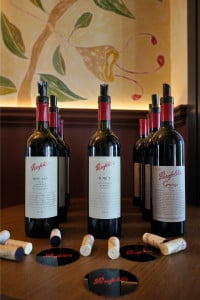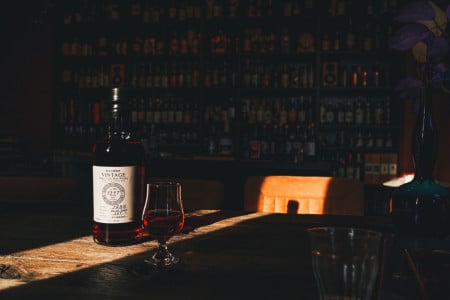Alsace is one of the most surprising regions in France. You imagine yourself in Germany, especially because of the names of cities, streets and buildings, but it has the sultry and relaxation that is so characteristic of Eastern France. The classic almost Swiss villages, the beautiful historic buildings and castles, the hills and vineyards, it is a different world. Especially if you are invited to a winemaker who does it really differently from many fellow winemakers and elevates terroir above all else: Domaine Marcel Deiss.
Marcel Deiss: the vineyards
And how can you get more in the mood than cycling through some of Marcel Deiss' vineyards: Mambourg, Grasberg and Rotenberg. On the outside you can see grapevines and rolling hills, but the difference is underground: the composition of the soil can vary enormously within a few meters and this variation is more complex than in Burgundy. And anyone who has ever stood at the vineyard Le Montrachet, for example, knows how quickly the soil conditions can change there.
When you enter Bergheim, the domaine is not to be missed. We were warmly welcomed by Marie-Helene Deiss, who immediately introduced us to the vineyards, their location and the general philosophy. And then the tasting started right away, the best choice: here we talk about the soil, the location, the terroir. As Marie-Helene herself described it: "a grape variety is like paper: it says nothing. So what you write on it is what matters".
A mix of grape varieties grows on each plot, as it used to be in the old days. In this way, the varieties compete with each other, which leads to quality improvement of the individual grapes. Domaine Marcel Deiss stimulates the vines to get their roots deep enough to get the best out of the terroir. So one tries to get the character of the soil in the grapes, so that every wine is an expression of its origin.
The taste of terroir
During our tasting, the location of the vineyard was shown for each wine and real pieces of soil were used to illustrate what the soil condition looks like. Each wine was clearly different, even if the wines had exactly the same composition of grape varieties. This was the case for example with Engelgarten and Rotenberg, which we tasted side by side in 2 glasses. The plots were right next to each other. Engelgarten is situated on an old river bed with pebbles and gravel, Rotenberg is old Jurrassic soil (Oolite limestone). Both wines were completely different, but each with their own specific touch. And when we asked which grapes the wine was composed of, Marie-Helene looked at us quizzically: "But that's not important at all, is it?". It turned out to be a combination of Riesling, Pinot Gris, Pinot Beurot, Muscat and Pinot Noir.
The tasting was a voyage of discovery of the terroir and showed what the Alsace and the various grape varieties can produce for enormous quality. The Grand Cru vineyard Schoenenbourg was briefly compared to Romanee Conti by Marie-Helene. A popular wine in Europe since the 12th century because of the excellent shelf life due to the composition of the soil. Schoenenbourg wines can become very old. A winemaker must consciously choose to make the wine. Unfortunately, according to Marie-Helene, that happens too little, so that Schoenenbourg no longer has the allure of the past, but the potential is still unchanged. And we could taste that afterwards, next to the Grand Cru Altenberg and Mambourg. What fantastic wines these were.
We tasted 18 wines that afternoon and we came to the conclusion that we should have visited Marcel Deiss much earlier. The philosophy behind winemaking, the intention with which the wines are made, the quality and certainly the price-quality, it all appeals to us. And to return to the importance of grape varieties and want to do 'it' differently: Domaine Marcel Deiss managed to get rid of the obligation to state the grape variety on the label a few years ago. Indeed: we do it differently here.
Too much to tell...
This Blog can go on for many more paragraphs, on the website of Marcel Deiss you can find all the information. And we try to keep our stock up to standard with often old vintages of the Grand Cru wines that only show their true quality at a later age.
When we left the domaine, Marie-Helene said goodbye with: "It's all about terroir: pass the message on!"





